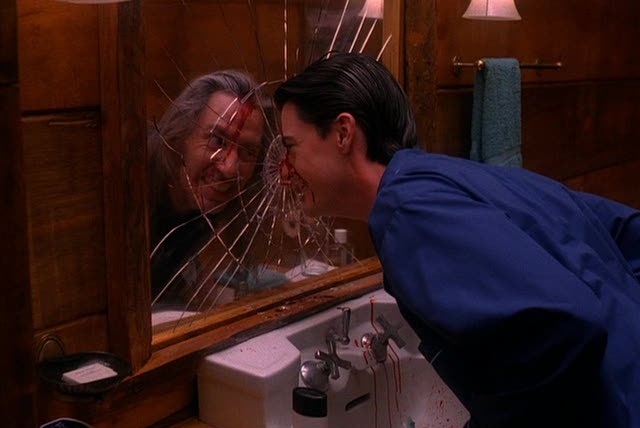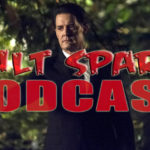
Twin Peaks was the first television show I was obsessed with. There were others I watched regularly up to that point. MacGyver was a Monday night staple for me in the late 80s. But Twin Peaks was the first series that changed my notion of what television could be, that convinced me the entertainments it provided could be equal to, if not greater than, what was being offered at the local movie theater. I once left a girl alone at the end of a date, before one of her parents could come and pick her up, because I had to run home to watch Twin Peaks. This is not the biggest reason I didn't get many dates in high school, but it certainly did not help. In the wake of Twin Peaks, there would soon come other shows I was more passionate about — The X-Files, Buffy the Vampire Slayer — but Twin Peaks was ground zero for my TV fandom.
At the time, the show was everything I wanted from a TV series but didn't even know was possible. You must remember, Twin Peaks, which ran for 30 episodes over two seasons in 1990 and 1991, came before those series I mentioned above, as well as prior to Lost, True Detective and Game of Thrones. (All shows that were inspired in ways large and small by Twin Peaks. For example, some of the dream sequences in Game of Thrones owe a heavy debt.) Created by film director David Lynch and writer David Frost, Twin Peaks was both weird and terrifying. It showed you images that would freeze your spine and embed themselves into your brain. It was midnight dark but still managed to be populated by fun, vibrant characters. It intended to tell a long and winding story at a time when I was used to my TV heroes going on a new adventure every week. It featured alternate dimensions and demonic entities and things my teen-aged self thought you could only find in a good Stephen King book. (The Dark Tower series was another one of my obsessions about that time.) It was designed as a puzzle and dropped elaborate clues daring you to solve it. The fact that all the supernatural mumbo-jumbo could also be viewed as strictly metaphorical added a layer to the series that my young mind was just mature enough to grasp. (Although let's face it, the show's a lot more fun if we accept Killer Bob at face value.)
The cast was wonderful, and Twin Peaks was one of the first shows that proved to me the power of the ensemble. It made me a Kyle MacLachlan fan for life. Madchen Amick was an early celebrity crush. It introduced David Duchovny to most of the world (as a cross-dressing FBI agent!) and featured such never-not-awesome people as Miguel Ferrer, Sherilyn Fenn, Ray Wise, Michael Parks and Billy Zane in both major and minor roles. It was spun-off into a Lynch-directed prequel film called Twin Peaks: Fire Walk With Me, which had FBI agents played by Chris Isaak and David Bowie, the latter of whom appears to be traveling through and/or stuck in time. Obviously, it's totally fucking amazing. Twin Peaks was a world I never wanted to leave. Unfortunately, the series burned as quickly as it did brightly. It was a sensation when it first premiered, but impatient viewers grew weary waiting for an answer to the show's central mystery: Who killed Laura Palmer? Many stopped watching, and once Lynch and Frost (who supposedly became more and more at odds as the show progressed) revealed the identity of the killer, folks abandoned the show in droves. The ratings collapsed. It didn't help that the series was creatively adrift in the hours following the reveal, though it rebounded mightily at the end, offering tantalizing hope for future seasons and new storylines that never materialized.
Well, never materialized until now. Suffice to say, when Lynch and Frost announced Monday that they were resurrecting their ground-breaking series in 2016 for a nine-episode season on Showtime, I was beyond excited. There are those who warn to be careful what you wish for and point out that bringing beloved properties like this back from the dead often proves disappointing. They are not wrong. And yet I'm more than willing to take the chance that this revival will be worth it, that it will offer a compelling and entertaining re-entry into a world that I once loved so dearly. In its favor are the fact that Frost and Lynch have agreed to write every episode, with Lynch directing all nine installments. (That last bit is huge news just based on the fact that the great Lynch has spent most of the past decade making documentaries, acting and messing around on the Internet.) I like the fact that it will be a true sequel, likely tethered to the original series via two hooks: the show's namesake Northwestern town and MacLachlan's Agent Dale Cooper. Considering his central role, as well as how we left him in what used to be the series finale, his presence is vital. Whatever other characters Lynch and Frost decide to bring back can be story dependent, and I've no doubt the two have brainstormed a number of new characters who have taken up residence in Twin Peaks during the past 25 years.
It's the town that matters. The town, its troubled history … and its connection to the Black Lodge, that nightmare space where maybe time doesn't work like it does in the real world. Perhaps only moments have passed there instead of 25 years. Only the Man From the Other Place knows, and maybe he'll be the one who tells us. As casting news and plot information starts to leak, I'm going to treasure theorizing about what pieces Lynch and Frost will pick up all these years later to start building with again. And when new Twin Peaks episodes finally arrive, I'll tune in as diligently as I did two and a half decades ago, wondering what haunting images its creators have dreamt up for us and expecting to become obsessed once more.
Like the Giant once said, it is happening again … and I couldn't possibly be any happier about it.











